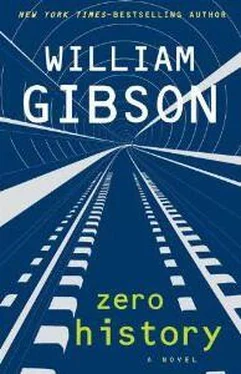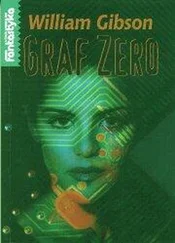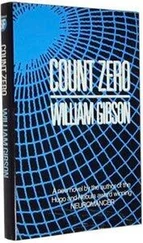William Gibson - Zero history
Здесь есть возможность читать онлайн «William Gibson - Zero history» весь текст электронной книги совершенно бесплатно (целиком полную версию без сокращений). В некоторых случаях можно слушать аудио, скачать через торрент в формате fb2 и присутствует краткое содержание. Жанр: Фантастика и фэнтези, на чешском языке. Описание произведения, (предисловие) а так же отзывы посетителей доступны на портале библиотеки ЛибКат.
- Название:Zero history
- Автор:
- Жанр:
- Год:неизвестен
- ISBN:нет данных
- Рейтинг книги:4 / 5. Голосов: 1
-
Избранное:Добавить в избранное
- Отзывы:
-
Ваша оценка:
- 80
- 1
- 2
- 3
- 4
- 5
Zero history: краткое содержание, описание и аннотация
Предлагаем к чтению аннотацию, описание, краткое содержание или предисловие (зависит от того, что написал сам автор книги «Zero history»). Если вы не нашли необходимую информацию о книге — напишите в комментариях, мы постараемся отыскать её.
Zero history — читать онлайн бесплатно полную книгу (весь текст) целиком
Ниже представлен текст книги, разбитый по страницам. Система сохранения места последней прочитанной страницы, позволяет с удобством читать онлайн бесплатно книгу «Zero history», без необходимости каждый раз заново искать на чём Вы остановились. Поставьте закладку, и сможете в любой момент перейти на страницу, на которой закончили чтение.
Интервал:
Закладка:
Hollis picked up the folded jeans. They were black as ink, unusually heavy. She turned them over and saw the baby-headed dog, dimly branded into a leather patch on the waistband. “They’re for sale? Tonight?”
“Friends will come. When you were here, I could not help you. I hope you understand.”
“I do,” said Hollis, not sure that she did.
“In rear, please. Come.”
Hollis followed her, ducking through a doorway partially concealed by a dark noren decorated with white fish. There was no white Ikea desk here, no decrease in the shop’s simple elegance at all. It was a smaller space, but as cleanly uncluttered, with the same sanded, unstained floor, the same candles. A woman was seated on one of two old, paint-scarred, mismatched wooden kitchen chairs, stroking the screen of an iPhone. She looked up, smiled, stood. “Hello, Hollis. I-”
Hollis raised her hand. “Don’t tell me.”
The woman raised her eyebrows. Her hair was dark brown, glossy in candlelight, nicely cut, but mussed.
“Deniability,” Hollis said. “I could figure it out, from what Meredith told me. Or I could just ask Reg. But if you don’t tell me, and I don’t do either of those things, I can continue to tell Hubertus that I don’t know your name.” She looked around, saw that Bo was gone. She turned back to the woman. “I’m not good at lying.”
“Neither am I. Good at hiding, not at lying. Please, sit down. Would you like some wine? We have some.”
Hollis took the other chair. “No, thank you.”
She was wearing jeans that Hollis took to be the ones she’d seen on the table. That same absolute black. A blue shirt, rumpled and untucked. A very worn pair of black Converse sneakers, their rubber sides abraded and discolored.
“I don’t understand why you’d want to see me,” Hollis said. “Under the circumstances.”
The woman smiled. “I was a huge fan of the Curfew, by the way, though that’s not it.” She sat. Glanced down at the iPhone’s glowing screen, then looked at Hollis. “I think it was my sense of once having been where you are.”
“Which is…?”
“I worked for Bigend myself. Identical arrangement, from what Mere tells me. There was something he wanted, the missing piece of a puzzle, and he talked me into finding it for him.”
“Did you?”
“I did. Though it wasn’t at all what he’d imagined. Eventually he did do something, repurposing aspects of what I’d helped him learn. Something ghastly, in marketing. I used to be in marketing myself, but then I wasn’t, after him.”
“What did you do, in marketing?”
“I had a very peculiar and specific talent, which I didn’t understand, never have understood, which now is gone. Though that hasn’t been a bad thing, the gone part. It stemmed from a sort of allergy I’d had, since childhood.”
“To what?”
“Advertising,” the woman said. “Logos, in particular. Corporate mascot figures. I still dislike those, actually, but not much more than some people dislike clowns, or mimes. Any concentrated graphic representation of corporate identity.”
“But don’t you have your own now?”
The woman looked down at her iPhone, stroked the screen. “I do, yes. Forgive me for keeping this on. I’m doing something with my kids. Difficult to keep in touch, with the time difference.”
“Your logo worries me, a little.”
“It was drawn by the woman Bigend had sent me to find. She was a filmmaker. She died, a few years after I found her.”
Hollis was watching emotion in the woman’s face, a transparency that easily trumped her beauty, which was considerable. “I’m sorry.”
“Her sister sent me some of her things. There was this unnerving little doodle, at the bottom of a page of notes. When we had the notes translated, they were about the legend of the Gabriel Hounds.”
“I’d never heard of them.”
“Neither had I. And when I began making my own things, I didn’t want a brand name, a logo, anything. I’d always removed branding from my own clothes, because of that sensitivity. And I couldn’t stand anything that looked as though a designer had touched it. Eventually I realized that if I felt that way about something, that meant it hadn’t been that well designed. But my husband made a compelling case for there being a need to brand, if we were going to do what I was proposing to do. And there was her squiggle, at the bottom of that page.” She looked down at the horizonal screen again, then up at Hollis. “My husband is from Chicago. We lived there, after we met, and I discovered the ruins of American manufacturing. I’d been dressing in its products for years, rooting them out of warehouses, thrift shops, but I’d never thought of where they’d come from.”
“Your things are beautifully made.”
“I saw that an American cotton shirt that had cost twenty cents in 1935 will often be better made than almost anything you can buy today. But if you re-create that shirt, and you might have to go to Japan to do that, you wind up with something that needs to retail for around three hundred dollars. I started bumping into people who remembered how to make things. And I knew that how I dressed had always attracted some attention. There were people who wanted what I wore. What I curated, Bigend would have said.”
“He’s curating suits that do retinal damage, these days.”
“He has no taste at all, but he behaves as if he’s had it removed, elective surgery. Perhaps he did. That search he sent me on somehow removed my one negotiable talent. I’d been a sort of coolhunter as well, before that had a name, but now it’s difficult to find anyone who isn’t. I suspect he’s responsible for that, somehow. Some kind of global contagion.”
“And you began to make clothing, in Chicago?”
“We were having children.” She smiled, glanced down at the screen, stroked it with a fingertip. “So it wasn’t as though I had much time. But my husband’s work was going well. So I could afford to experiment. And I discovered I really loved doing that.”
“People wanted the things you made.”
“That was frightening, at first. I just wanted to explore processes, learn, be left alone. But then I remembered Hubertus, ideas of his, things he’d done. Guerrilla marketing strategies. Weird inversions of customary logic. That Japanese idea of secret brands. The deliberate construction of parallel microeconomies, where knowledge is more congruent than wealth. I’d have a brand, I decided, but it would be a secret. The branding would be that it was a secret. No advertising. None. No press. No shows. I’d do what I was doing, be as secretive as I could about it, and avoid the bullshit. And I was very good at being secretive about it. I’d gotten that from my father as well.”
“It seems to have worked.”
“Too well, possibly. It’s at that point, now, where it either has to go to another level or stop. Does he know? That it’s me?”
“I don’t think so.”
“Does he suspect?”
“If he does, he’s doing a good job of pretending he doesn’t. And right now he’s focused on a crisis that has nothing to do with either of us.”
“He must be in his element, then.”
“He was. Now I’m not so sure. But I don’t think he’s giving Gabriel Hounds much attention.”
“He’ll know it’s me soon enough. We’re coming out. It’s time. Tonight’s pop-up is part of a that.”
“He’ll still be dangerous.”
“That’s exactly what I wanted to say to you. When Mere told me about you, I realized you’d already had the Bigend experience, but you were back for more, even though you struck her as a good person.”
“I never planned it that way.”
“Of course not. He has a kind of dire gravity. You need to get further away. I know.”
Читать дальшеИнтервал:
Закладка:
Похожие книги на «Zero history»
Представляем Вашему вниманию похожие книги на «Zero history» списком для выбора. Мы отобрали схожую по названию и смыслу литературу в надежде предоставить читателям больше вариантов отыскать новые, интересные, ещё непрочитанные произведения.
Обсуждение, отзывы о книге «Zero history» и просто собственные мнения читателей. Оставьте ваши комментарии, напишите, что Вы думаете о произведении, его смысле или главных героях. Укажите что конкретно понравилось, а что нет, и почему Вы так считаете.











